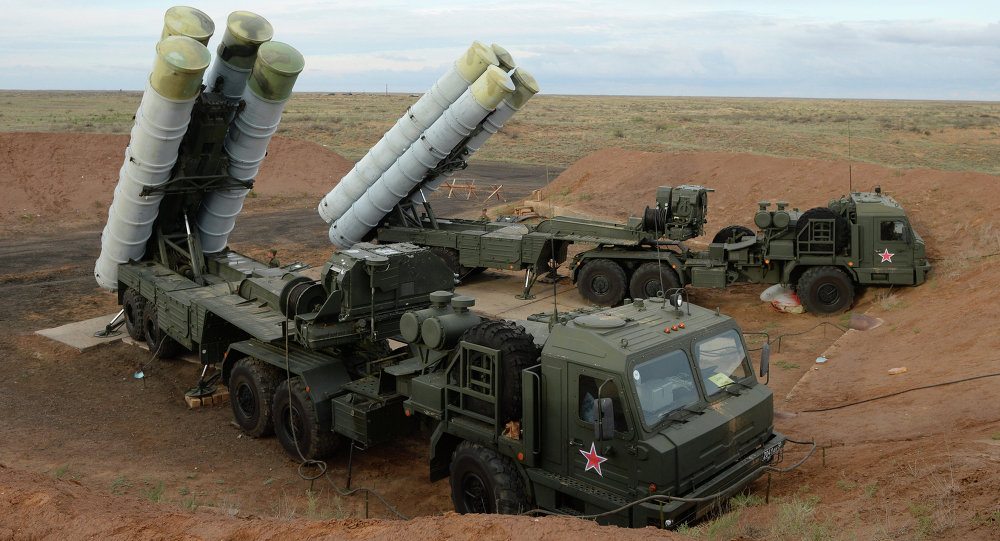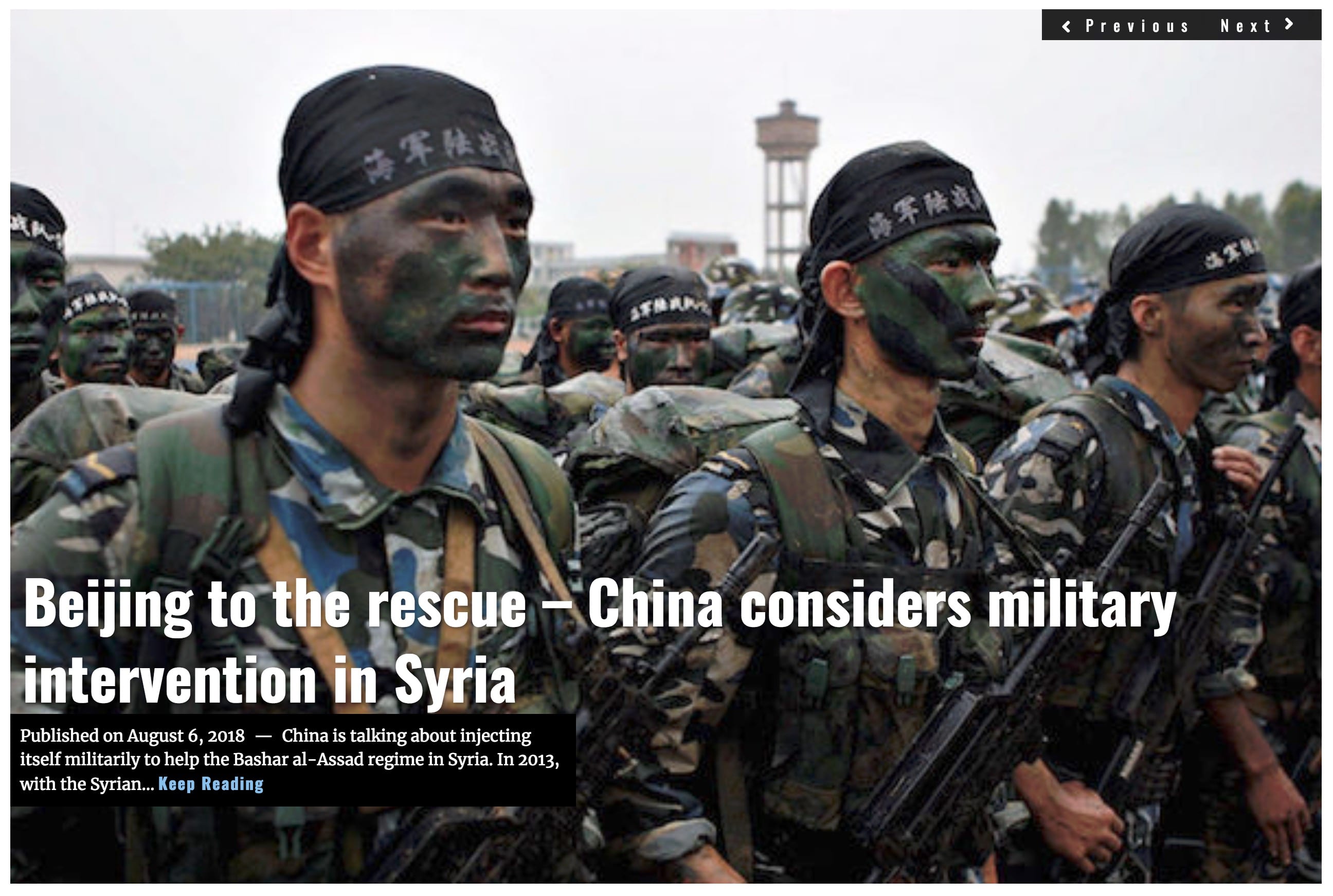Russia continues to export arms, including its S-400 missile system, to long standing U.S. and NATO allies causing legal and political headaches.
In the past two years Qatar, Iraq, Egypt and even the Kingdom of Saudi Arabia, all regional allies of the United States, have expressed interest in purchasing Russian anti-aircraft solutions such as the S-400 Missile Defense System, a modern long range surface-to-air system. Even more troubling is the fact that Turkey, a long-standing NATO member of great importance, is also considering the S-400 as a viable option.
The U.S. Congress is now arguing that these allies are subject to sanctions under a federal law known as the U.S. Countering America’s Adversaries Through Sanctions Act (CAATSA). This has caused a diplomatic rift, as allies are now having to deal with the U.S. casting these arms deals as part of an ongoing political showdown between the U.S. and Russia.
![Image Russian S-400 Triumph Growler medium-range and long-range surface-to-air missile systems on display in the Victory Day parade at Red Square in Moscow [REUTERS / RIA Novosti]](https://limacharlienews.com/wp-content/uploads/2018/08/s400.jpg)
With secondary sanctions against Russian defense and energy entities, the U.S. Government appears hopeful that its allies will be compelled to invest more in U.S. Foreign Military Sales (FMS) or seek CAATSA waivers. Turkey, India, and Qatar appear particularly eager to purchase the S-400 system from Russia. There is a growing global consensus that the Russian S-400 is the best air-missile defense system, with various analysts and media outlets claiming it is the most powerful long-range air missile defense system in the world.
Essentially, the S-400 is a technologically more advanced variation of the Soviet S-300P anti-aircraft system. It began as a late 1980s upgrade program, only to emerge in the mid 90s as the S-300PMU-3. It was not until it entered its final phases in the mid-2000s that it was decided the advances made were so significant, it qualified for a designator: the S-400. The S-400 features significantly improved and advanced radar systems, enhanced speed, and high-resolution imagery over its direct predecessors the S-300PM2 and S-300PMU2. All in all, the S-400 missile defense system is extremely effective, with sharp accuracy that can quickly destroy incoming high-value targets like drones, ballistic missiles, and aircraft.

In response, the U.S Senate Committee on Armed Services considered temporarily removing Turkey from being part of the F-35 program under the National Defense Authorization Act (NDAA) so as to send a strong message that the United States will not integrate their most advanced stealth jet fighter with a Russian capability. An S-400 integration with an F-35, the committee argued, could put the United States and NATO at operational risk by potentially disclosing intelligence and complicating interoperability.
Additionally, the NATO Secretary-General stated that it would be very difficult to integrate the S-400 missile defense system with NATO’s air defense architecture. All NATO members have pledged to integrate military equipment to ensure that all systems work together. It is vital that all NATO equipment must maintain mutual standards. These standards are developed based on long term joint planning, exercises and training. An S-400 integration would disrupt joint information sharing, command and control, and protection of missile interceptors and radars.
In response to these concerns, India has requested a CAATSA waiver through the Trump Administration. Reliant on Moscow as one of its top defense suppliers (more than sixty percent of its defense articles are Russian imports), India is interested in the S-400, yet has been feeling pressure from the U.S., which officially considers India a regional, democratic ally. New Delhi remains instrumental in some of America’s top national security priorities, including its regional approach in Afghanistan and India’s strategic importance in the U.S. Indo-Pacific defense strategy.
Meanwhile, Qatar and Russia have discussed a deal in purchasing the S-400 along with small arms and grenades. This is understandably alarming for Washington defense insiders, as the U.S. has been strengthening its defense ties with Doha for over twenty years. Qatar has been a vital partner in Operation Inherent Resolve by hosting one of the largest U.S. military bases in the Middle East and is complementary in joint air operations in Syria and Iraq. Qatar is also involved in many U.S. arms deals, including U.S. helicopters, C17 engines and equipment, and McDonnell Douglas F-15 Eagles.
![Image Russian President Vladimir Putin and Qatar's Emir Sheikh Tamim bin Hamad al-Thani shake hands during a signing ceremony following a meeting at the Kremlin in Moscow, Russia March 26, 2018. [REUTERS / Sergei Karpukhin]](https://limacharlienews.com/wp-content/uploads/2018/08/Screen-Shot-2018-08-07-at-3.33.26-PM.jpg)
In order to stay competitive against Russia’s aggressive foreign military sales program, the U.S. should consider a multilateral approach.
First, the U.S. should continue to actively enforce CAATSA. Second, Washington should remain actively engaged with allies by negotiating competitive options to deter interest in acquiring Russian compatibilities. In the case of Turkey, Washington made the right decision to reinvigorate negotiations with Ankara in purchasing the U.S. Patriot Missile System over the Russian S-400. Such a retaliatory move was justifiable, as Moscow continues to try to shake up U.S. defense ties with strategic allies. For instance, Moscow initiated talks with Iraq over the S-400 knowing that Washington is conducting current military operations with Baghdad.
Third, Congress should still consider CAATSA waivers on a case-by-case basis, approving waivers only when benefits outweigh the costs. In other words, it is vital that Congress thoroughly calculates how much the sanctions will adversely affect U.S. strategic partnerships.
Lastly, the U.S. must convince its strategic allies that it remains a reliable partner with a coherent foreign policy approach. Mixed messages will fail to deter key allies from purchasing Russian-made capabilities, as will counterproductive foreign policy decisions such as failing to promote the spread of democracy, overtly fighting with Qatar over Saudi Arabia, and demonstrating a lack of strategy in Syria beyond the anti-ISIS campaign. Counterproductive decisions will weaken relationships and inflame distrust, provoking allies into considering purchasing Russian arms.
Worthy of note, just this May China received its first delivery of the Russian S-400 missile system.
Asha Castleberry, Lima Charlie News
[John Sjoholm contributed to this article][Edited by Anthony A. LoPresti]
Asha Castleberry is an adjunct faculty professor at Fordham University. She teaches U.S. Foreign Policy, International Politics, and United Nations Peace Operations. She is a U.S. Army Veteran and she served for Combined Joint Task Force-Operation Inherent Resolve in Iraq and Kuwait.
Lima Charlie World provides global news, featuring insight & analysis by military veterans, intelligence professionals and foreign policy experts Worldwide.
For up-to-date news, please follow us on twitter at @LimaCharlieNews
In case you missed it:

![Image When your allies prefer to buy Russian arms - America’s growing headache [Lima Charlie News]](https://limacharlienews.com/wp-content/uploads/2018/08/When-your-allies-prefer-to-buy-Russian-arms-America’s-growing-headache-0001.png)



![Image Trump refusal to sanction Russia despite bi-partisan mandate 'perplexing' [Lima Charlie News]](https://limacharlienews.com/wp-content/uploads/2018/02/Trump-refusal-to-sanction-Russia-despite-bi-partisan-mandate-perplexing-480x384.jpg)





![Image Trump refusal to sanction Russia despite bi-partisan mandate 'perplexing' [Lima Charlie News]](https://limacharlienews.com/wp-content/uploads/2018/02/Trump-refusal-to-sanction-Russia-despite-bi-partisan-mandate-perplexing-150x100.jpg)